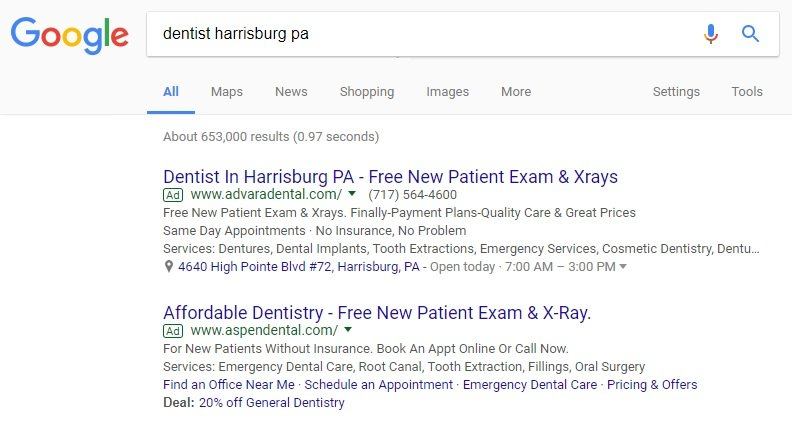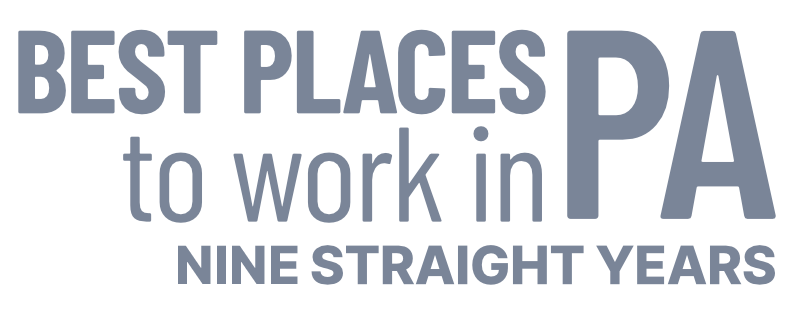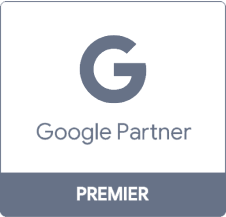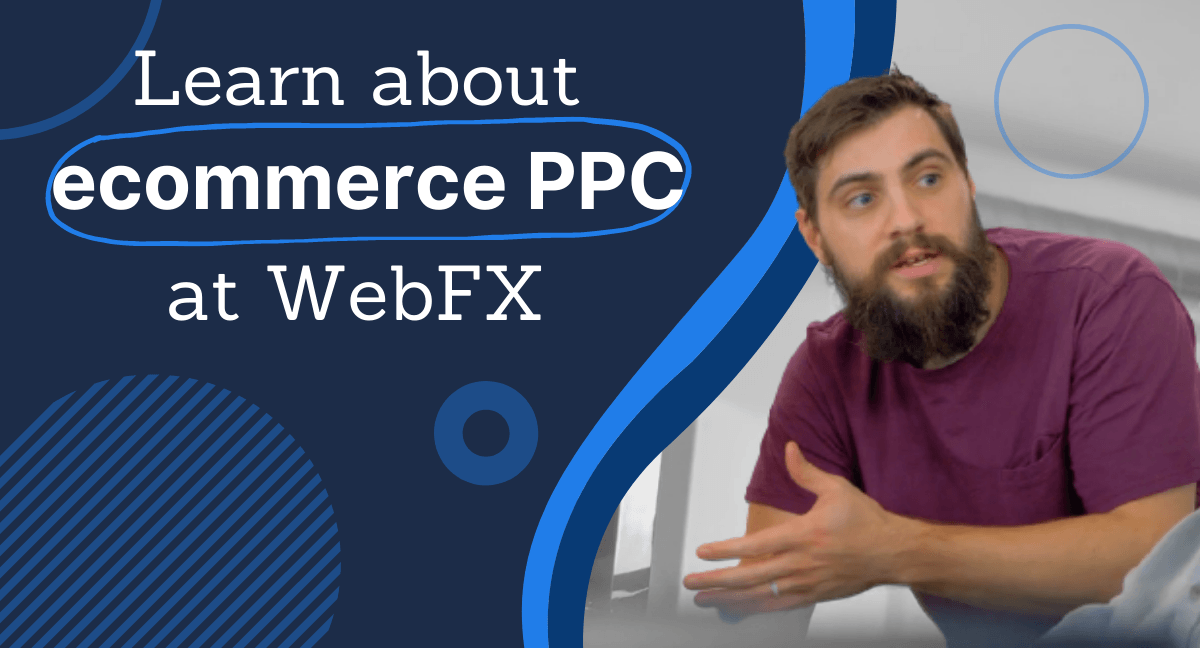How Does PPC Bidding Work?
In the screenshot below, you can see which search engine results are naturally occurring, and which are paid, thanks to Google’s “Ad” tags:

Each of these ads is part of a PPC campaign. They’re run by different businesses, with the goal of users clicking them and visiting their websites.
But how does Google know which ads to run when you type in a long- or short-tail key phrase? That’s where PPC bidding comes into place.
Call 888-601-5359 to speak with a strategist about PPC campaign management services from WebFX, or keep reading to learn more about how PPC bids work.
A basic overview of PPC bidding
When you go to an auction, you try to outbid your competitors for merchandise you want. You see a country table from the 1800s, and you get a price in your head for what you’re willing to pay. As the auctioneer begins to collect bids, you may find that others in the room have a different notion of what the table is worth.
Essentially, the highest bidder for the table will take it home. The same is true for the highest bidder for PPC advertising.
When you embark on a PPC advertising campaign, you’ll be asked a number of questions by the platform, such as Google Ads. One question will be what amount you’re willing to pay every time someone clicks on your ad. The tricky part is that you have no way of knowing if what you’re suggesting is going to be higher or lower than another’s bid for the same targeted keywords.
For instance, you may want to target your PPC ad to people who search for the phrases, “buy antique clocks in Vermont” and “Vermont antique clock dealers”. You decide that you’re willing to pay 20 cents for each click on your advertisement.
However, over the next two days, you do a few experiments and realize that users aren’t seeing your ad very often. This likely means that another PPC advertiser has outbid you. Their ad is going to appear more frequently, because Google knows it will get more money every time the ad is clicked.
Make sense?
The upshot is that if you’re paying attention, you can simply go back to your original ad and change the bid amount to a higher level. But just as you would at a typical brick-and-mortar auction, you have to be cognizant of the fact that you don’t want to blow your budget.
Sure, you could say you’ll give Google $1 per click, and that might make your ad pop up all the time. However, can you afford this kind of PPC campaign for very long? It’s better to increase in smaller increments so that you don’t accidentally blow your entire marketing budget on one campaign.
How to improve your PPC bidding skills
As you get more familiar with PPC bidding, you’ll start to get a feel for how high of a bid you’ll need to get the exposure you want. We also recommend that you:
Pay close attention to your analytics and generating reports
At first, it may be wise to look over your PPC campaign analytics as often as once per day. If you find you’re paying for a lot of “junk” clicks, that’s a clear signal that you need to pause your campaigns and investigate.
One likely cause is choosing keyword targets that are too broad. This can invite people to click who are not actually interested in your products, and while that will give your traffic a boost, it’s ultimately not a wise investment of your budget.
Use PPC advertising in conjunction with sales or events
These are tremendous opportunities for you to get in front of potential buyers immediately. If you have a closeout sale happening in the next three days, you can get a PPC campaign up and running in very little time.
Plus, if you know you’ll only need the PPC ad for a few days, you can simply prescribe a budget per day that you’re willing to pay. This will help keep your bidding in check, and your budget in the black.
Update your bids, especially if conversions are high
Have you noticed that your conversions are going through the roof on a particular PPC ad? It may be worth it to invest more of your dollars into that ad, because you know that you’re more than likely to get a decent return on investment.
Whenever you see a spike in conversions, take charge immediately. You can always lower your bid when and if the conversion rates start to drop off.
Traffic attracted through PPC advertising yields 50% more conversions than organic advertising.
Are you leveraging PPC in your marketing efforts? Let’s get started.
View the Guide

PPC bidding: The bottom line
PPC is an effective tool to get your business noticed on today’s crowded Internet. And once you start bidding appropriately and consistently, you’ll find that it’s much less confusing than you might have originally assumed.
If you don’t have the time to manage your own campaigns, but are interested in using PPC to further your business’s goals, don’t hesitate to contact us! Our dedicated team of Internet marketers is more than happy to assist you with PPC management, as well as all other aspects of your digital marketing efforts.
Related Resources
- Expand Your Reach with Tubi Advertising
- Google Ads Basics: How to Get Started with Online Ads
- Google Adwords: a Case Study on “Quality” Score
- How Do Search Engines Rank Paid Ads?
- How Long Does It Take PPC to Work? 3 Months (And Here’s Why)
- How Much Does It Cost to Advertise on Bing?
- How to Calculate a PPC Budget for Your Business
- How to Create a Killer Microsoft Advertising Campaign
- How to Grow Your Online Business with Free Google Product Listings
- Microsoft Advertising’s New Auto-Generated Remarketing Lists
Marketing Tips for Niche Industries
- Garage Door Advertising & PPC Management
- Getting Started with PPC for Lawyers
- Handyman Advertising: 3 Ideas for How to Advertise a Handyman Business
- Healthcare PPC: 7 Hospital Advertising Tips for Your Ads
- How to Use PPC for Insurance Agencies
- How Your Cardiology Practice Can Start a PPC Campaign
- Orthodontist PPC: Pay-Per-Click for Orthodontists
- Outstanding PPC for Contractors
- Pay-Per-Click Advertising (PPC) for Cabinet Manufacturers: How to Get Started
- PPC for Audiologist: Get Started with Audiologist PPC










